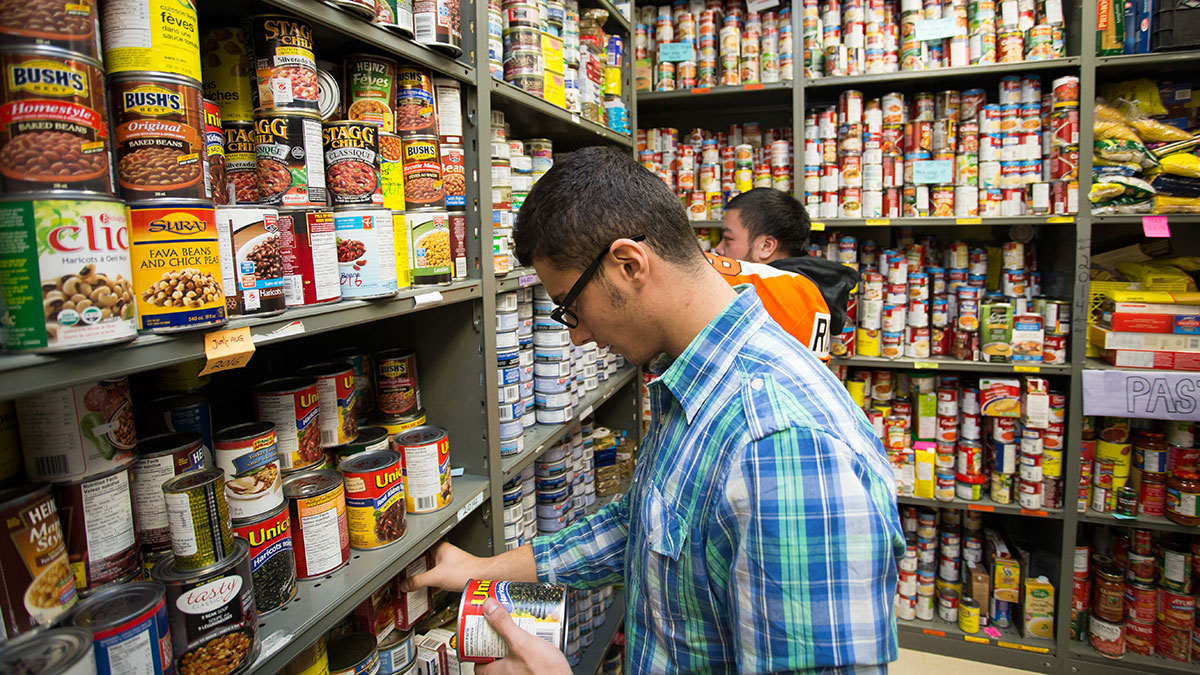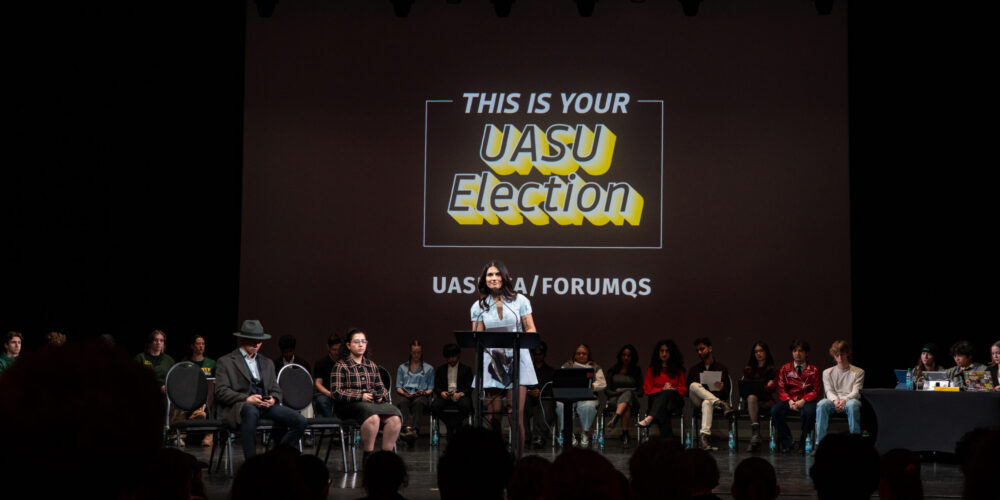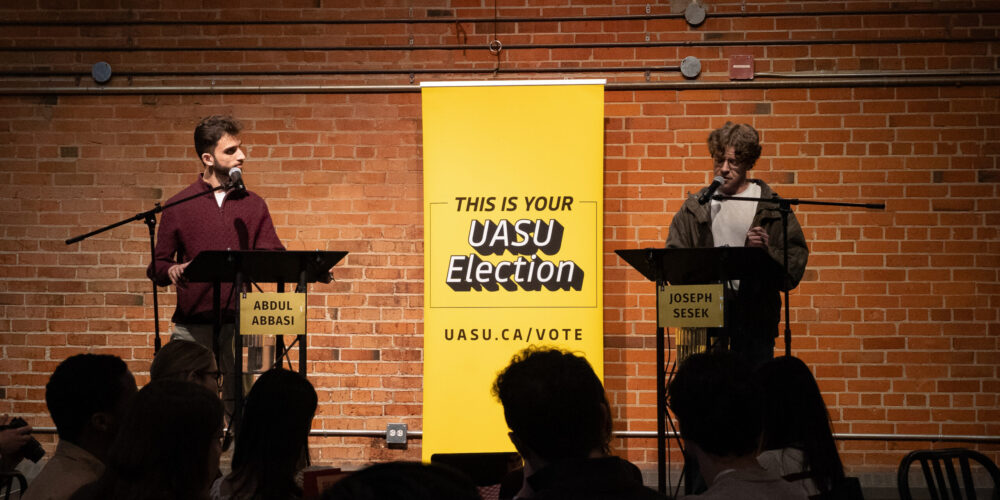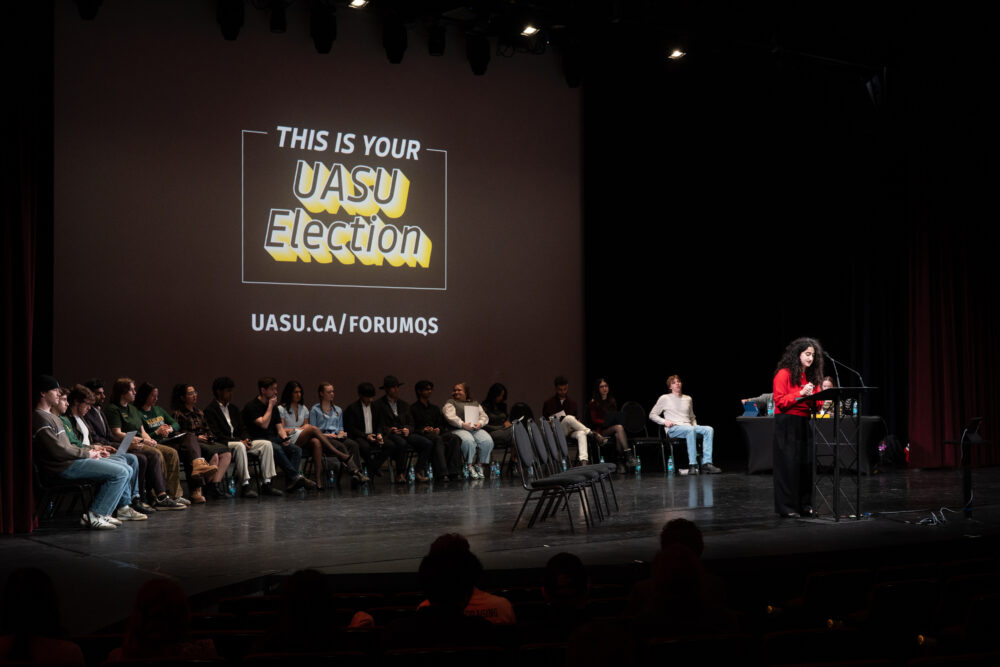SU Elections 2024: Indigenous Students’ Union Forum Recap
The fourth University of Alberta Students' Union 2024 elections forum was hosted by the Indigenous Students' Union.
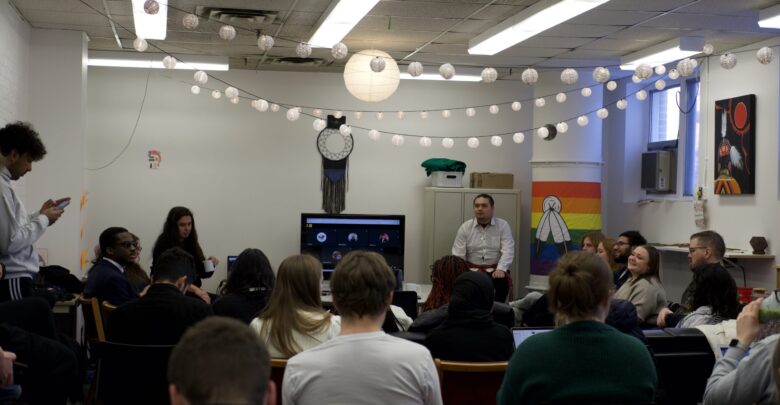 Macy Wong
Macy WongNOTE: The Gateway is running a DFU campaign in the 2024 Students’ Union Elections. We will be covering our campaign in a strict environment that strives to promote impartiality, transparency, and fairness. If you’d like more information, please see our statement or Conflict of Interest Plan.
The fourth forum of the University of Alberta’s Students’ Union (SU) 2024 elections was hosted by the Indigenous Students’ Union on March 1. The event was offered in-person and online.
Victor Olsen, vice-president (consultation and engagement) of the ISU, gave the land acknowledgment and a prayer. Candidates were given two minutes each for opening statements. Each race was then asked a question by the ISU’s president, Sophie Martel. Afterwards, audience members had the opportunity to ask questions directed to specific races.
Here is the TL;DR version of this forum:
- President: collaborating with the ISU, decolonizing the SU
- Vice-president (external): transportation, helping the ISU get connections
- Vice-president (operations and finance): housing supports, possible funding solutions
- Vice-president (academic): Indigenizing course content with required Native studies classes
- Vice-president (student life): increasing mental health supports for Indigenous students and presence at ISU events
- Board of Governors Representative: creating virtual platform and committees for Indigenous students
- The Gateway: fills gaps in platforming Indigenous voices on campus
- The ISU: supporting Indigenous students, providing educational opportunities
- The Landing: partnerships with Indigenous student groups and services, addressing colonialism
- OASIS: Indigenous perspectives, expansion of services for Indigenous students
Presidential candidates discuss collaborating with the ISU and decolonizing the SU
In this opening statement, Michael Griffiths, current vice-president (student life) and presidential candidate, talked about his work with the ISU during his term.
Griffiths said they worked together to plan the 2023 residential school memorial; oppose the Clean Air Strategy at General Faculties Council (GFC); lay the groundwork to get a OneCard reader for the ISU lounge; and acquire $15,000 in funding to bring Reservation Dogs actress Paulina Alexis to Indigenous Celebration Week (ICW) as the keynote speaker.
“I’m so proud of our growth and collaboration this year. This is the work I want to continue as president,” Griffiths said.
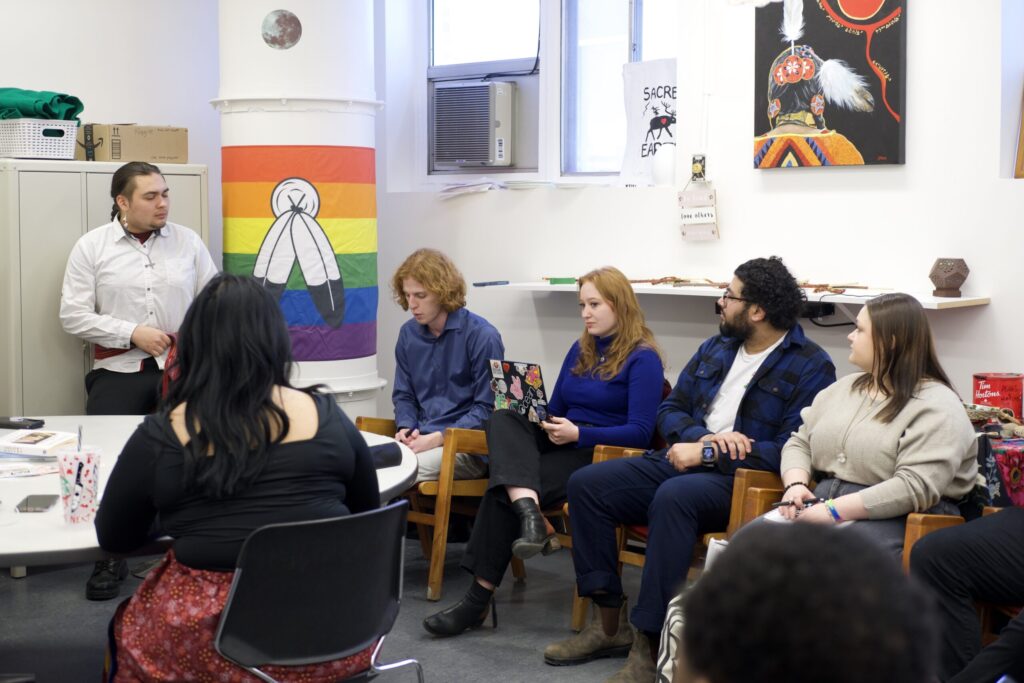
Following Griffiths, Glock said her sustainability activism has been informed by Indigenous teachings. Women in Leadership, a student group Glock is involved in, has hosted Indigenous speakers, Glock said.
“The teachings shared with me in my gender studies classes such as the one with Professor Lana Whiskeyjack, and the readings I’ve done myself, continue to demonstrate the vitality of bringing a decolonial Indigenous voice to all aspects of campus life,” Glock said.
If elected president, Glock said she would work to create an environment where Indigenous students can thrive and “don’t have to worry about residential school denialism being brought on campus.”
Martel asked the presidential candidates what decolonizing the SU means to them and how they would work toward this goal.
Answering first, Glock said that decolonization is important to her. Additionally, she said the SU should be offering resources to Indigenous students “instead of just demanding knowledge.” Instead, she said people should work in collaboration with Indigenous peoples and highlight their voices.
According to Griffiths, working with the ISU during his time as vice-president (student life) has opened his eyes to work that can be done to decolonize the SU. Griffiths also mentioned that the ISU has delegated authority on behalf of the SU. He said the ISU should take advantage of this to speak on behalf of Indigenous students, and the SU needs to support them in this.
Marija Cvetkovska, a member of Students for Justice in Palestine (SJP) and Vice-president (academic) candidate Farah Elgaweesh’s campaign manager, said the university hasn’t talked about Palestine. She mentioned Samantha Pearson’s termination from the U of A Sexual Assault Centre (UASAC), and the resulting suspension of UASAC services since November 18. Cvetkovska asked the candidates “if the university is going to take any accountability for this.”
First, Glock said she has made her views on Palestine clear and that she will “always advocate for students facing crises in their home countries.” Additionally, Glock said her student group, Sustainable Development Goals Alliance (SGDA), made a public statement on their Instagram.
Griffiths said he would like to see the university acknowledge the violence in Palestine, but said the provincial government is “applying a lot of pressure” and that this played a hand in the decision to terminate Pearson.
“I agree in a lot of the sense [that] the university not acknowledging the genocide that’s going on in Palestine has continued to be a problem,” Griffiths said. “The university is very unlikely to say something when the provincial government is holding them in place like that.”
Griffiths said he thinks the president needs to “facilitate an environment where students are free to protest.” This past year, Griffiths said the SU has worked with the university to ensure peaceful protests are not shut down and empowered student clubs to organize.
Later, Falon Giroux, the vice-president (finance) of the ISU, asked a general question to all candidates about what opportunities, programs, and collaborations they would bring forward to the ISU.
Glock said part of her platform includes providing research resources so Indigenous students can participate in research initiatives. She also wants to provide spaces on campus for traditional medicine to be grown, and more spaces on campus for Indigenous students to practice smudging.
Griffiths said he would continue the work he’s already started as vice-president (student life). He said his platform talks about increasing supports for Student Representative Associations (SRAs), such as providing outreach support. Additionally, he mentioned working toward the ultimate goal of Maskwa House.
-Dylana Twittey
Vice-president (external) candidates discuss advocacy for Indigenous students
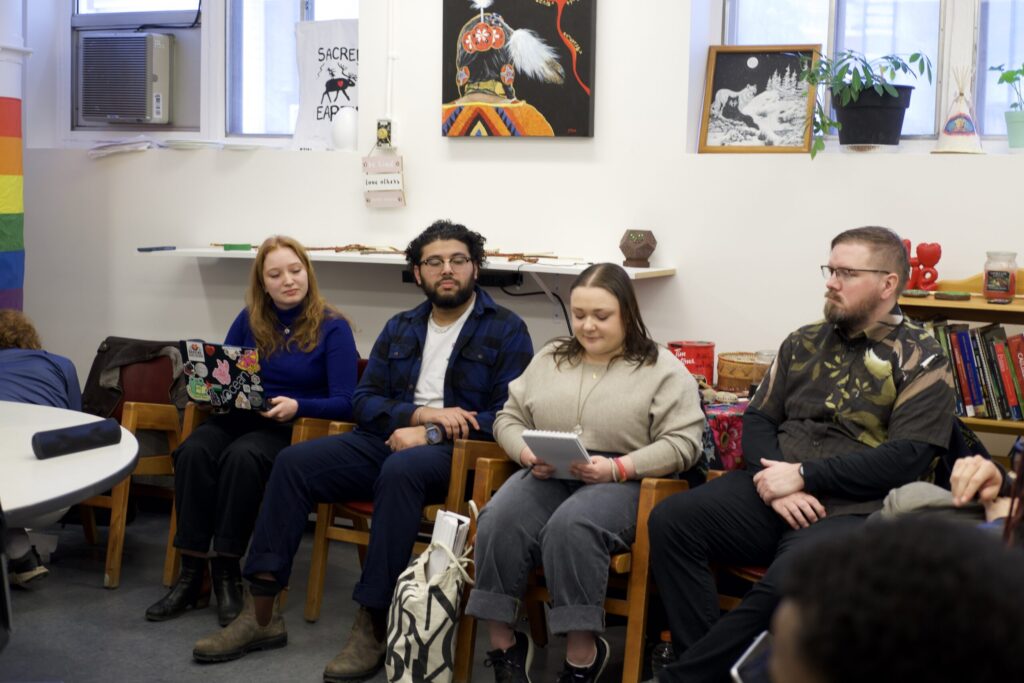
In her opening statement, vice-president (external) candidate Logan West said that Indigenous students are “valued members of our campus community.” She also said that she wants to not only listen to Indigenous students, but collaborate with them as well.
One of her priorities is transportation, since Indigenous students face a disproportionate amount of discrimination by the Edmonton Transit System (ETS), which she promised to keep accountable. Finally, she mentioned holding the university accountable for the commitments relating to transit safety outlined in the Indigenous Strategic Plan.
In his opening statement, vice-president (external) candidate Abdul Abbasi said he would learn about the issues impacting Indigenous students, and help them make connections.
Abbasi mentioned advocating for the Post-Secondary Student Support Program — a federal grant for Indigenous students — to the Government of Canada, as well as child care subsidies. Finally, he said he would work with the provincial government to acquire the remaining funding to build Maskwa House.
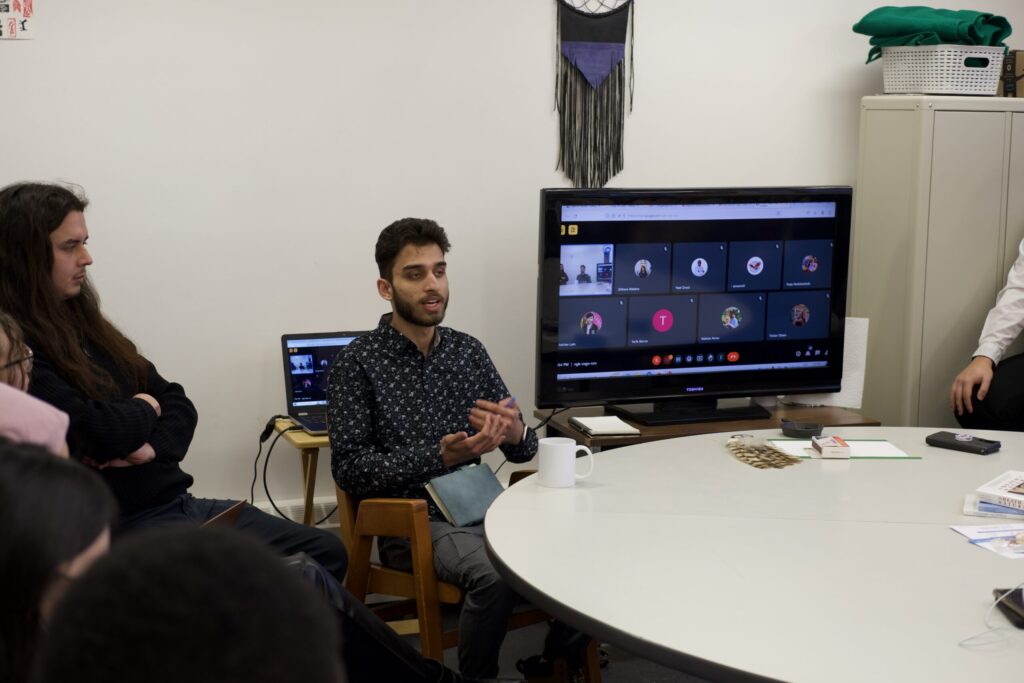
Later, Martel asked the two candidates what they plan to spend most of their time advocating for and how it will impact Indigenous students.
Abbasi said that most of his time would be spent with student groups at the university to learn about their issues, specifically the ISU and the ISA.
West said she plans to spend most of her time advocating at the municipal level, as she believes this is where the most change could happen.
She added how problems of housing disproportionately affect Indigenous students on campus and said that the SU should ensure safety for Indigenous students by having resources available.
Prometheus Voaklander, a volunteer with Halt the Hike, SJP, and the Youth Communist League (YCL), asked the two candidates if they would be willing to advocate for free tuition for both domestic and international students.
Martel deemed the question difficult to answer, and gave candidates the option of answering. Both chose to answer, saying that in the role of the vice-president external, their priorities lie elsewhere for the upcoming year.
In response to Giroux’s question, Abbasi said that the main way he will help the ISU will be through getting them connections. West said that she admires the advocacy the ISU has done for their students and wants to collaborate with them to increase visibility and raise their profile to the public through media.
-Lale Fassone
Vice-president (operations and finance) candidates discuss housing supports and funding
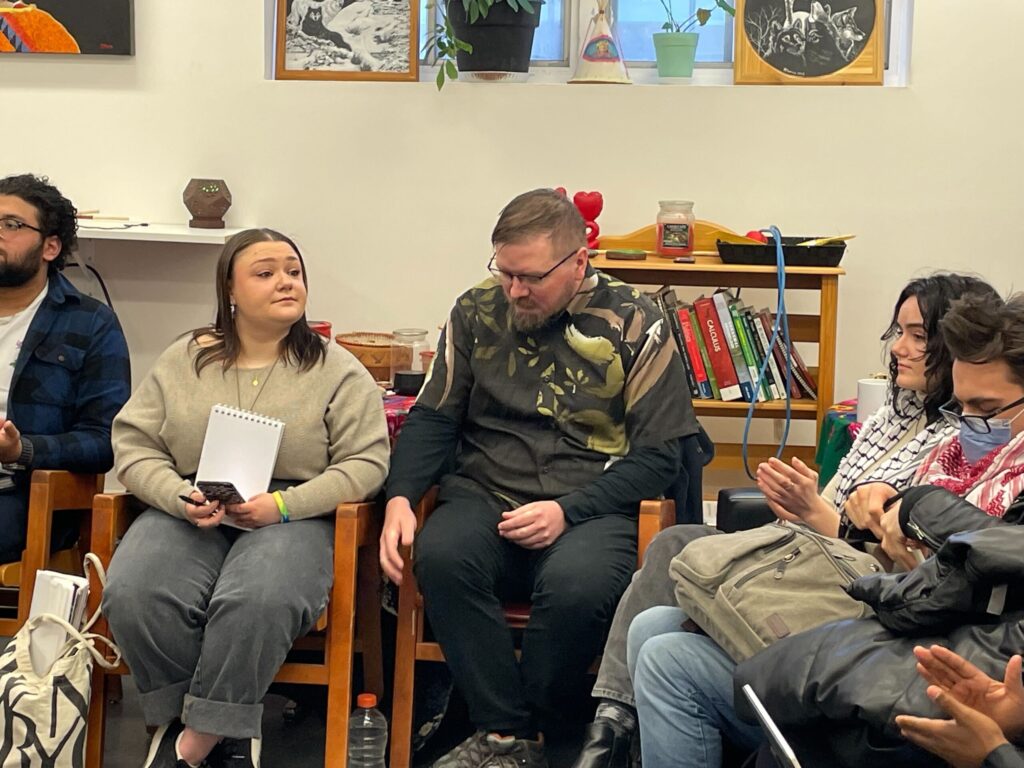
In his opening statement, Levi Flaman, candidate and current vice-president (operations and finance), spoke about the housing issues Indigenous students face. If re-elected, he said he’d want to start a SU housing commission that can look into buying or building residences around campus.
He listed the actions he would take this year that would most impact Indigenous students, like safety on transit, reducing discrimination, and important audits.
Following Flaman, candidate Joachim Bony said he consulted with the ISU in preparation for his campaign. He acknowledged the challenges faced by Indigenous students on campus, such as a lack of academic supports, and low enrollment and retention.
Bony said that he is aware of the “racism and discrimination that continues to plague our university.” He said he wants to improve supports for Indigenous student groups, and the ISU in particular, “to make sure they have access to resources that they need.”
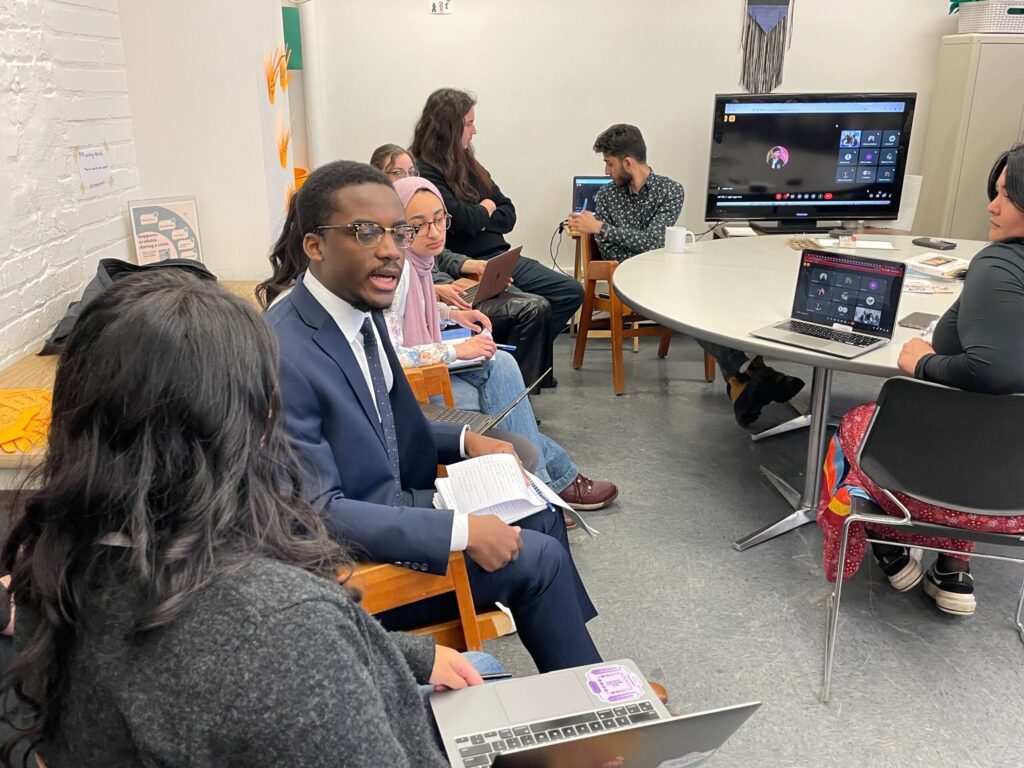
Martel asked the candidates how they plan on addressing “the issue of student housing, that affects campus as an entirety, but also disproportionately [affects] Indigenous students.”
Citing the Government of Alberta’s Budget 2024, Bony said that finding support for student housing outside the university would be difficult. He emphasized the importance of “optimizing our services and doing the best we can with what we already have.”
Flaman re-iterated his idea on SU-owned housing, and that it would be the “longer-term solution.” In the short-term, Flaman proposed getting funding from external parties — like private companies — which could go toward buying apartment buildings.
“Companies are pursuing more environmental, social and (corporate) governance (ESG) initiatives, and are tripping over themselves to donate to these initiatives to look good. The money’s there … we just have to go out and get it.”
Nisrin Salah, a member of SJP, said that following Russia’s invasion of Ukraine, Ukrainian students received supports that the SU “deemed unfeasible for Palestinian students.” Supports for Ukrainian students came from the U of A and federal government, not the SU. For the 2022-23 academic year, the U of A offered supports for Ukrainian students including waiving tuition fees and providing funding for living costs. She asked how candidates would advocate “for Indigenous people in Canada and Palestine” to receive similar supports.
In response Flaman said that the financial supports “came from the federal government. If there were any resources that were put to those students, I don’t believe that came directly from [the SU].”
Flaman added that if resources came from the university, “that would be more of a question for vice-president (student life) or vice-president (academic).”
Bony suggested that the SU can look at optimizing its own services to see how they can provide support more effectively, such as looking at the Peer Support Centre and adding more crisis supports.
“It’s a very sensitive topic,” Bony said. “And it is one that brings a lot of emotions because there’s a lot of suffering involved.”
A member of the Muslim Students’ Association asked the candidates about the SU’s Single Source Cold Beverage Policy. He said that the Coca-Cola Bottling Company operates in an “illegally occupied region of land in occupied Palestine.” He wanted to know how each candidate would “ensure the SU has ethical business partners, as mandated by the SU Standing Orders.” The SU Standing Orders cover how Students’ Council sessions are structured, but do not include information about SU businesses. The person who asked the question reached out to The Gateway and clarified they were referring to the SU Operating Policy, and misspoke when asking the question.
Bony said that in renewal conversations, he would look at what business partners “bring to our community, what they allow us to do, the benefits, and also the negative points.”
“We want to make sure that the partnerships that we create on behalf of students represent where our students stand.”
Flaman explained that during the SU’s business decisions, “financial considerations are just one of the aspects they look into.” He said that ethical business practices are also considered.
Flaman said this issue will not be out of student hands, as to renew the deal, students have to vote on a plebiscite. “Students are going to have the final say,” he said.
–Declan Carpenter-Hall
Vice-president (academic) candidates discuss Indigenizing course content and the student experience
In her opening remarks, vice-president (academic) candidate Layla Alhussainy committed to learning more about Indigenous issues.
To expand her knowledge, Alhussainy said she would listen to Indigenous students’ feedback and read ISU reports. She also mentioned that she sits on the Council of Faculty Associations (COFA) and GFC, “where student and faculty concerns are heard.”
Alhussainy said a step towards decolonizing education is to “promote Indigenous ways of knowing.” As an example of this, she mentioned implementing Native studies classes into required course content at the U of A. She also mentioned the importance of safe transportation for Indigenous students.
“Every student deserves to feel safe during their commute to campus, and we must recognize that a sense of safety is experienced differently among people.”
Next, vice-president (academic) candidate Farah Elgaweesh acknowledged that “Indigenization and decolonization must be integral” to her work as a representative.
After consulting with Indigenous students and stakeholders, such as the First Peoples’ House, Elgaweesh said she “gained a better understanding” of the issues Indigenous students face. She also mentioned Indigenizing course content and advocating for accommodations to the current exam deferral policy, which she said “does not give room for Indigenous ways of knowing and being.”
During question period, Martel asked both candidates how they plan to hold the U of A accountable through the Student Experience Action Plan (SEAP).
Elgaweesh said that she would push for Indigenizing course content by working with the Academic Planning Committee (APC) and Office of the Provost (Equity, Diversity, and Inclusion).
She also mentioned that accessibility to resources is important, and that connections among SRAs and student associations should be fostered. As well, Elgaweesh said it is important that the ISU “has the right to represent itself and speak about students’ needs.”
Alhussainy replied that it’s “essential” for resources to be accessible to students, specifically mentioning modules on eClass pertaining to Indigenous education. In addition, Alhussainy said that “opportunities that highlight Indigenous ways of knowing” for non-Indigenous people are necessary.
“Indigenous students and their experience should be highlighted actively and not just [as] an afterthought,” Alhussainy said. “We need to hold the university accountable when that is not practiced.”
During open forum, Olsen asked both candidates how they will increase Indigenous representation in science, technology, engineering, and mathematics (STEM) programs at the U of A.
Alhussainy said she is committed to building a “repository of resources” for students, and implementing required Native studies classes into different faculties.
Elgaweesh said that centralizing academic resources and ensuring Indigenous students have access to STEM opportunities is a part of her platform. She also pushed for expanding the academic opportunities available on CampusBRIDGE.
-Aparajita Rahman
Vice-president (student life) candidates aim to increase involvement within the Indigenous student community
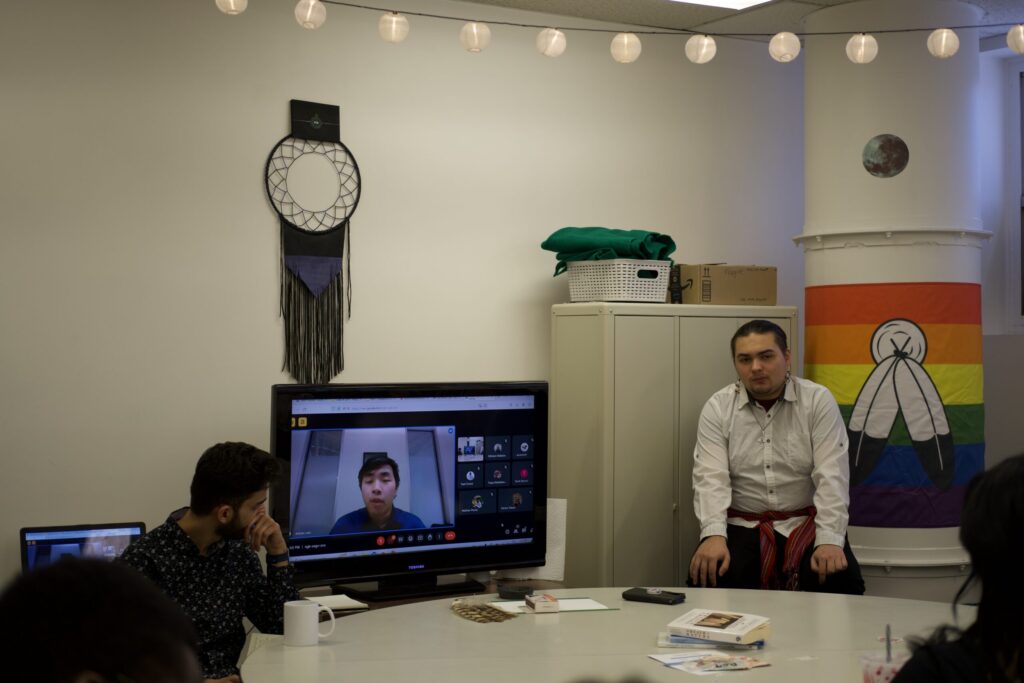
In his virtual opening statement, vice-president (student life) candidate Adrian Lam stated his intention to “ensure that there are adequate supports to the Indigenous communities.”
“It is my understanding and my commitment to you all that my advocacy reflects the teachings, histories, and cultures of the peoples who were here on this land before us,” Lam said.
Following Lam, vice-president (student life) candidate Renson Alva discussed increasing the presence of Indigenous students’ voices in SU decision-making. He also mentioned learning from Indigenous students and meeting regularly with the ISU.
“I cannot work and help with the community unless I know more about them and their struggles. I have to educate myself on that,” Alva said.
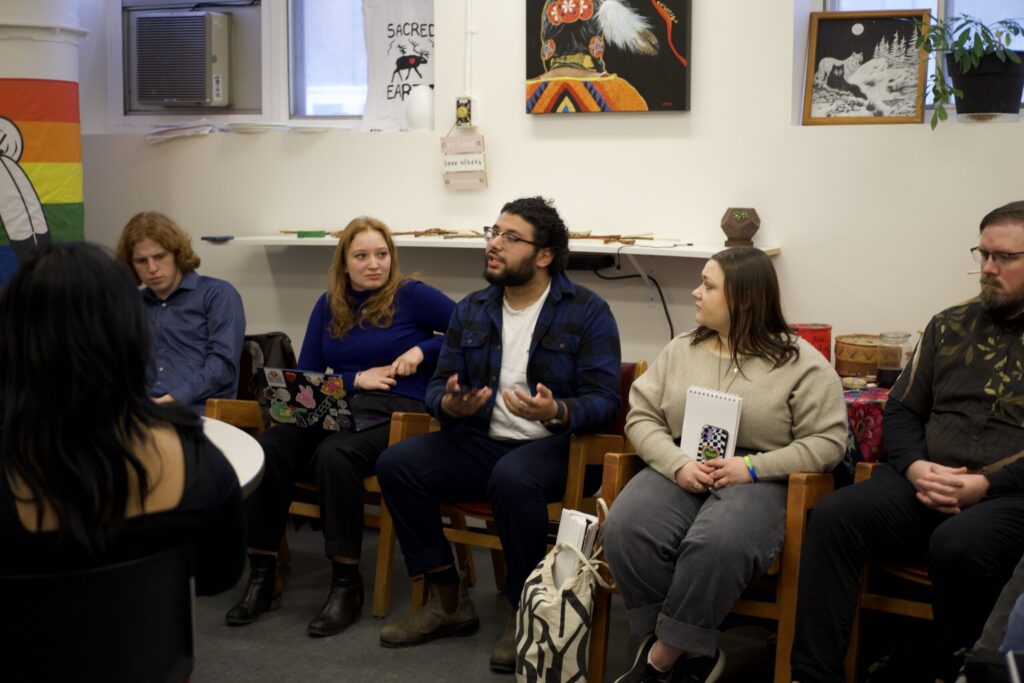
Later, Martel asked the candidates how they plan to uplift and connect SRAs and Faculty Associations (FA) across campus.
Alva said that “the ISU should be taking the lead on this since they have the authority to advocate.”
He raised the possibility of working with the ISU “to hire more counselors focused on Indigenous matters.”
Following Alva, Lam stated that he wants to “connect with different student representative organizations by setting up recurring meetings with them.”
Lam mentioned uplifting and connecting “the SRAs and FAs across all three of our campuses” through the vice-president (student life), who can “connect with everyone on a more one-on-one basis.”
During the open forum, The Gateway asked the candidates how they plan on improving mental health supports for Indigenous students if elected.
Alva discussed the potential for using funding for honorariums that has been set aside, to hire staff at the Peer Support Centre that understand Indigenous perspectives and issues.
This would ensure “that Indigenous folks are able to be comfortable talking about those mental health topics … [and have] culturally-competent care,” Alva said.
Following Alva, Lam mentioned the Government of Alberta’s Budget 2024, which has allocated $10 million to creating mental health spaces in post-secondary institutions over the next three years. He plans to look into this funding and using it to “expand our mental health services at the U of A.”
During open forum, Ange Cullen, the vice-president (internal) for the ISU, asked the candidates how they plan to maintain the relationship between the SU and ISU.
Lam said that he plans on having “recurring meetings with people at the ISU and including them in those conversations when [they] deal with Indigenous subject matters.”
Following Lam, Alva emphasized being present at ISU events to demonstrate his support and maintain the relationship.
To Giroux’s question, Lam said that he plans to “highlight the different kinds of programs and opportunities that the ISU already has.”
Additionally, he mentioned “working with vice-presidents and executives [to provide support] for any issues that they may have.”
Alva chose not to answer the question.
-Peris Jones
BoG representative candidate says she can filter Indigenous students’ concerns through virtual platform
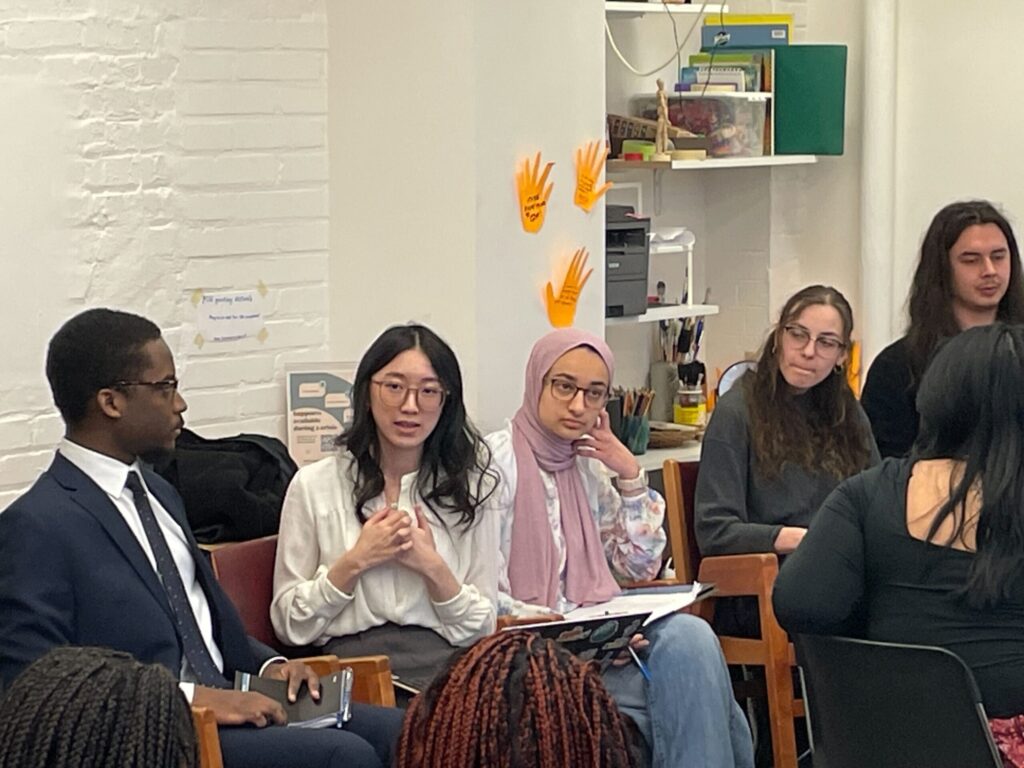
In her opening remarks, Board of Governors (BoG) representative candidate Adrien Lam said it’s “important to ensure ongoing support for educational resources, classes, scholarships, and safety for Indigenous students.”
Lam wants to work towards creating a virtual platform which allows students from all three U of A campuses to anonymously share their concerns. She said Indigenous students will be able to declare if they are Indigenous on the platform to voice their specific concerns.
Furthermore, Lam mentioned plans to work on enhancing student engagement and connections with Indigenous students on campus. As an example, she mentioned forming small committees.
During question period, Martel asked Lam how she plans to “effectively advocate against tuition hikes and hold the university to a standard that all students deserve.”
Lam repeated that she would employ her virtual platform to receive students’ concerns, as talking to every student “is not a possibility.”
She added that students could select whether they are a part of the ISU on the platform, and she could filter different demographics for their feedback on tuition needs. She could then take these concerns to the BoG. However, Lam said she is not expecting students to reach out to her.
“I have to … actively pursue those collaborations,” she said. “With not just the ISU, but Indigenous students on campus. That is how I effectively plan to advocate on your behalf.”
-Aparajita Rahman
The Gateway commits to filling “gap[s]” in Indigenous reporting on campus
Emily Williams, chair of the Gateway Student Journalism Society (GSJS), presented The Gateway’s referendum.
The Gateway’s dedicated fee unit (DFU) would go toward reporting on campus news at the U of A. The proposed fee is $2.64 per fall and winter semester, and $1.32 per spring and summer semester. Students would have the option to opt-out. The fee would start from fall 2024, and continue for a five-year term.
“On a campus that often talks about decolonization but rarely has … timely follow-through, it’s essential to have an independent student-run news outlet to report on that gap,” Williams said.
“These are stories that are rarely covered by other news outlets, and The Gateway is committed to telling them,” Williams added. “But, I don’t want to pretend [that] we’ve always gotten it right. Because I know we haven’t.”
Lastly, Williams said that The Gateway is committed to further collaborating with the ISU and finding ways to platform Indigenous voices on campus.
-Aparajita Rahman
ISU fee will support students and educational opportunities
The ISU’s plebiscite was presented by Olsen. The proposed $1 dedicated fee unit (DFU) is the same as previous years. Olsen said this renewal will support the ISU for the next several years.
Olsen said the DFU will enable the ISU to support the students on campus who have the least access to resources, housing, and child care supports.
“The ISU will directly put the money from the DFU towards supporting our specific marginalized community,” Olsen said. Additionally, Olsen said that the ISU is for all students. He mentioned that the ISU has done educational events for students and staff.
“If you want to learn from Indigenous students, you must support Indigenous students so they’re not choosing between speaking in support of their community, and putting food on the table,” Olsen said.
“There must be funding available for Indigenous students to shine, to be excellent, and to exist on a campus that was never meant for them.”
-Dylana Twittey
The Landing commits to pursuing partnerships with Indigenous student groups and services
Emily Lukacs, the student coordinator at The Landing, presented The Landing’s referendum.
The Landing, the U of A’s centre for gender and sexual diversity, is proposing to raise its fee from $1.85 per fall and winter semester for full-time students on North Campus, to $3.75. Lukacs explained that the fee is needed for The Landing to continue reliably providing current and future services.
Lukacs said that The Landing is founded on anti-oppressive practices and they understand that transphobia and homophobia are “directly related to and resulting from” colonial ideals and structures.
The Landing pursues the mission of combating oppression based on gender and sexuality by addressing the roots of ongoing colonialism. Lukacs said The Landing does this through partnerships with the Edmonton Two Spirit Society and centering the decolonial narrative in the education they provide at their library.
With the increase in their DFU, Lukacs said The Landing commits to pursue partnerships with Indigenous student groups and services further.
-Lale Fassone
OASIS plans to expand the snack bar that Indigenous students have relied on
Hussain Alhussainy, the current president of the Organization for Arts Students and Interdisciplinary Studies (OASIS), presented OASIS’s referendum. Alhussainy said he is on the campaign team for vice-president (academic) candidate Layla Alhussainy, but that her campaign is unrelated to OASIS’s FAMF.
Full-time Faculty of Arts students would pay OASIS’s proposed FAMF of $5 per term. The previous fee was $3 per term. The FAMF would support students in the faculty of arts and go toward events like a speaker series, services for the arts discount card, skillshops, free menstrual products, and advocacy efforts across the faculty.
In late March, OASIS will be hosting an event about the value of an arts degree from Indigenous perspectives, Alhussainy said.
Alhussainy said that with this fee they will expand the snack bars which “unfortunately” Indigenous and international students have relied on due to increasing inflation and the affordability crisis.
-Lale Fassone
UPDATE: On March 2 at 4:38 p.m., this article was updated following a clarification from a member of the Muslim Students Association, who had asked the vice-president (operations and finance) candidates a question regarding the Single Source Cold Beverage Policy. In his original question, he had referenced the SU Operating Policy, but misspoke and said the SU Standing Orders instead. For the sake of clarity and transparency, The Gateway included the original question as asked, but updated the article to include that the student misspoke, and add a link to the Operating Policy.

